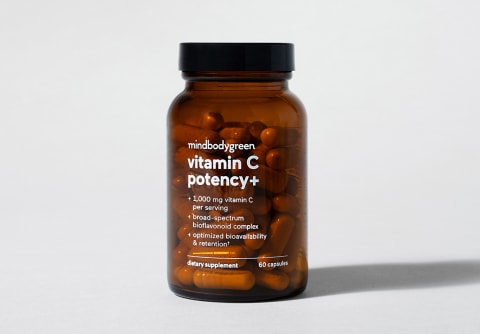Advertisement
This ad is displayed using third party content and we do not control its accessibility features.

Image by Danil Nevsky / Stocksy
September 01, 2024
We carefully vet all products and services featured on mindbodygreen using our
Our selections are never influenced by the commissions earned from our links.
Cold season is in full swing, and when you start to get that telltale throat tickle, you’ll want to start taking preventive measures right away.
Saline nasal spray and medications like Sudafed and Benadryl have long been used for this purpose.
However, if you’re reading mindbodygreen, chances are you’re looking for a more holistic approach to cold prevention and management.
So, we asked the bestselling author of Vibrant and recognized leader in functional medicine Stacie Stephenson, D.C., CNS, all about how she kicks sniffles to the curb.
What to do when you feel a cold coming on
According to Stephenson, a conventional doctor likely would recommend the combo of saline nasal spray, Sudafed, and Benadryl, to keep a cold from becoming a secondary infection. But as Stephenson says, there is potential for unpleasant side effects—short term and potentially long term—with taking these drugs, and you can get the same or similar results from more natural remedies.
“I don’t think it’s necessary to load up on over-the-counter pharmaceuticals to keep cold symptoms at bay and to help a cold resolve sooner,” Stephenson says.
Instead, you can get a head start on cold season by adding the right supplements to your routine from the get-go. Stephenson notes that you always want to supplement with vitamins D and C, not just when symptoms appear.
Stephenson also notes that consistently eating a diet rich in fresh fruits and vegetables will supply you (and your immune system) with a full spectrum of nutrients to support your body in fighting off viruses before they turn into infections.
And in terms of what she recommends when symptoms do appear, she can get behind the saline spray (which she says will help with uncomfortable congestion that can turn into a throat or ear infection), as well as upping your vitamin C and zinc intake. Of course, you’ll also want to test for COVID-19 to rule out that possibility and keep yourself and your community members safe.
Additionally, she recommends “drinking warm green tea with a squeeze of lemon (more vitamin C) and a spoonful of raw honey (a natural cough suppressant),” and taking magnesium glycinate in the evenings to help with sleep.
Get some sunshine outdoors if you can safely do so, and be sure to drink a lot of water—not juice, she adds. “Eat soup, whole citrus fruit, and berries when you feel hungry, and sleep more than usual. In other words: Take care of yourself, and your body will take care of your cold virus,” Stephenson says.
The takeaway
If you’ve been feeling the sniffles lately, be sure to add vitamins D and C to your routine (here are our fave vitamin D supplements and vitamin C supplements), load up on green tea and lemon, and get plenty of sleep to support your body naturally so it can support you through this cold season.


